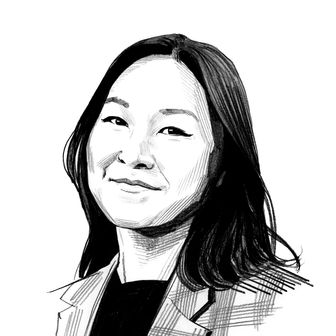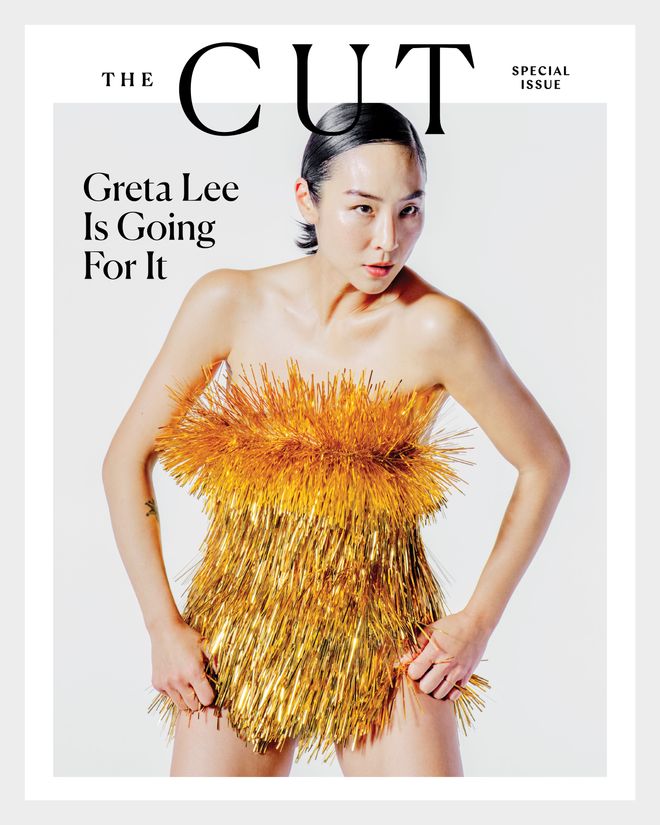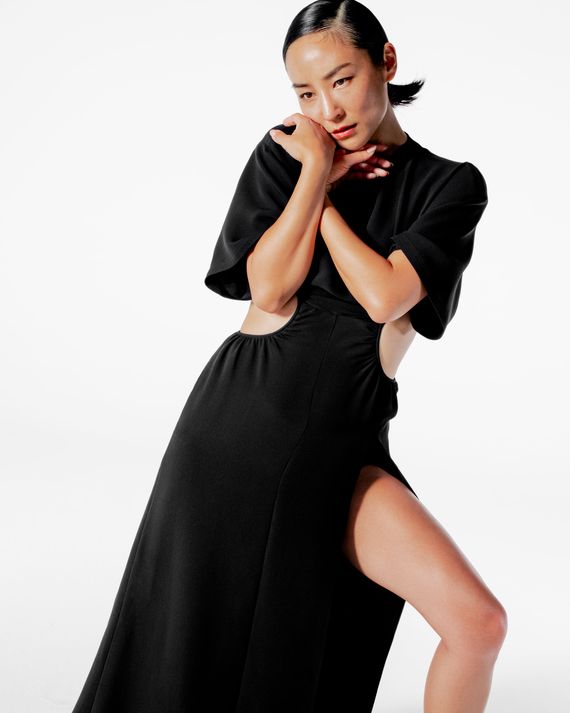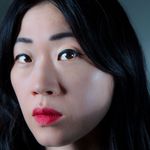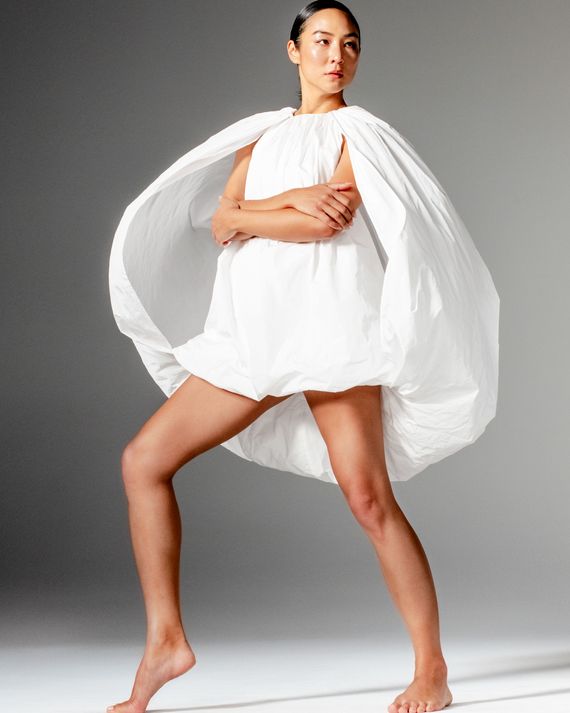
Before she entered the rarefied world of the Hollywood elite, Greta Lee took a step back. In 2020, she moved with her family from Brooklyn to El Sereno, a gentrifying working-class Latino neighborhood on the Eastside of Los Angeles. She settled in a small hilltop home atop an acre of land previously zoned for cattle grazing and considered acquiring some goats like her neighbors had done — that is, “until I Googled what they sound like, and they sound exactly like whining children,” she says. She now spends her free time raising three chickens, tending to wild grasses, and harvesting her own perilla leaves and avocados. “It’s a whole thing, trying to open up a Whole Foods at our house,” she declares with just a tinge of self-mockery. “It feels like a holistic way to live for us with our kids and a good balance for me in this insanity. This Sunset Tower insanity.”
We’re at Sunset Tower Hotel’s the Tower Bar, the ritzy, wood-paneled haunt of anyone who’s anyone in the motion-picture industry, where the shaded stranger obstructing your view of the swimming pool might be an Oscar nominee. Lee has become a regular this awards season, but she makes a minor show of bristling at the bar’s fripperies. “This is total bullshit. Mark Ruffalo is here. And they don’t have pickles,” she whispers in faux protest after her quest to order a regular-degular burger goes south. Lee had arrived in a tan zip-up hoodie and jeans, her hair slicked back into a scrunchie, waving at me from across the room like an old college buddy on airport-pickup duty. She looks like an off-the-clock model, luminous in such a way that she could wear a Minions T-shirt out and still get swarmed by street-style photographers. She seems to know half the industry professionals power-lunching over Caesar salads today. A petite Asian publicist extracts herself from a prime poolside spot to trade “hiiiii”s before returning to converse with Ruffalo. A man in a baseball cap reveals himself to be a producer of her Oscar-nominated film, Past Lives. “This is David,” Lee says by way of introduction, and his placement at the table directly behind us forces me to inquire, only half-jokingly, whether he’s a plant.
Spring Fashion Issue
In Past Lives, Lee stars as Nora Moon, a charming and headstrong Korean Canadian woman who, as a child, relocated with her family from Seoul to Toronto. Twenty years later, she is a rising playwright in the East Village, and married to a fellow writer, when she reconnects with her childhood sweetheart and wonders what might have been had she never left Korea. The film is like a dream-pop song — elegiac, longing, beautiful in its simplicity — and Lee is its crackling life force, suffusing a character weighed down by what-ifs with waggish, understated levity. “I didn’t even know that side of Nora — the one that’s completely effervescent and knows how to just glow in the wind,” says director Celine Song. Past Lives premiered at Sundance to rapturous reception, becoming an improbable awards-show contender, a modest indie from a debut director competing against bedazzled blockbusters like Barbie.
For the first 20 years of her career, Lee, who is 40, was cast in supporting parts on television; Past Lives is her first lead role, one in which she has the luxury of playing a normal person. “I’ve been thinking about how radical that is still for women of color,” she says. “Unfortunately, because of certain systems, I often get relegated to playing a caricature of someone.” The film’s success has given her many “Pinch me” moments recently — “Nicolas Cage was like, ‘I love Past Lives.’ What? That’s insane,” she says — but she knows how to play the part. Lee has become a fixture of best-dressed lists, an “It” girl with a talent for ensuring that her clothes never wear her. (Her stylist, Danielle Goldberg, has worked with Alexa Chung and the Olsen twins.) Her outfits are often sleek with dynamic silhouettes: a flared gray Loewe set that evokes a futuristic stingray, a plunge-neck scarlet Bottega Veneta gown, a faux-fur-topped duster with sparkly pom-pom heels. She keeps the rest minimal, the primary accent on her face those diamond-edged cheekbones.
Lee grew up in nearby La Cañada Flintridge, a chirpy little girl with old-school theatrical ambitions who would dress up like Liza Minnelli and belt Frank Sinatra’s cover of “New York, New York.” Despite a stubborn self-belief, she says, her early years were disillusioning. She attended Harvard-Westlake, the elite prep school with a roster of notable alumni that has its own separate Wikipedia page. Her senior year, she thought she might get cast as a lead in the school’s production of Into the Woods, but instead the theater director created new parts for her and another Korean American student as Kabuki puppeteers. She encountered similarly limited roles studying musical theater at Northwestern University, where she performed sketch comedy. (She met her husband, the TV writer and producer Russ Armstrong, through the college’s long-standing variety show, Mee-Ow.) “Looking back, it’s this impossible situation of wishing I could have challenged my institutions more,” she says.
New York, where serious people lived, was always the dream. She moved there immediately after college in 2005. Lee landed a bit part as the roommate to an incest victim on Law & Order: SVU, appeared on Broadway in the comedy-musical The 25th Annual Putnam County Spelling Bee, and occupied the living room in a cramped Second Avenue apartment “with 1,000 people and their boyfriends.” Opportunities arrived in fits and starts; between auditions, she served pork buns at Momofuku Ssäm Bar. In 2012, Lena Dunham saw Lee perform in the Off Broadway production 4000 Miles and was electrified, clutching her friend’s hand every time she came onstage. Dunham started writing a part for her on HBO’s Girls the next day. “I wanted her to play someone who had a lot of self-proclaimed power, an ease that makes people want to join her,” Dunham says. She came up with the conceited art gallerist Soojin, who in her eyes represented “a kind of New York girl that all our girls wanted to be — busy, chosen, glamorous.”
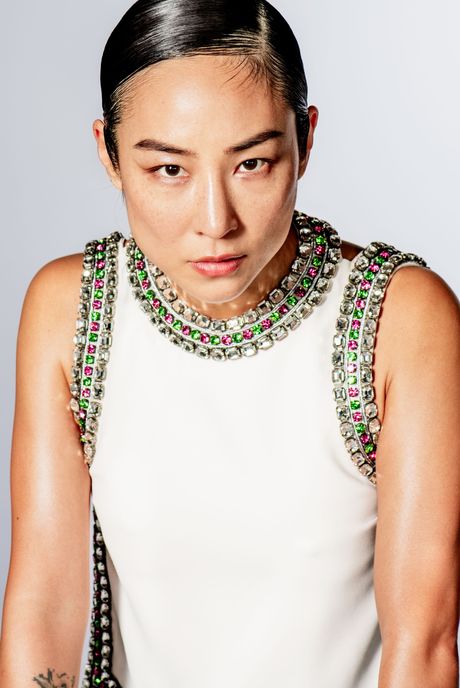

Soojin was the kind of ostentatious niche type off which Lee made her name on TV. Others include High Maintenance’s “Homeless Heidi,” a baby-voiced con artist who takes herself out on the dime of whichever Brooklyn hipster she’s hooking up with, and Russian Doll’s Maxine, a high-strung bohemian who memorably coos to her time-stuck best friend, “Sweet birthday baby.” The mid-2010s were a golden age for women in comedy, and today Lee is gracious and diplomatic toward the various female showrunners and writers — Dunham, Amy Schumer, Tina Fey, Amy Poehler — who have cast her; better to be a self-effacing friend on Inside Amy Schumer’s viral “Compliments” sketch than, say, Lab Technician 2 on a CW drama. “I like to think that they were much more expansive in thinking about what kind of roles they could dream up even for other people,” she says. I also think back to the less sanded-down statement Lee gave this publication in 2018. “They’re all white women, right? I’m still finding myself in these situations where I see that we need backups,” she said, still searching for people who could advocate for her. “There’s only so much I can do.”
By the end of her almost two-decade tenure in the city, Lee had become an aspirational New York figure, at least on the lifestyle front — a Fashion Week regular roaming Clinton Hill in Rachel Comey, a low-key connoisseur of local dining with a mental rolodex of the best hot-pot spots and dinner-party invites from Alison Roman. But careerwise, she was frustrated, looking at a future of limited-calorie roles. At some point, she vented her frustrations to Schumer, who convinced her that the only way forward was to write her own parts. “She was sort of like, ‘Okay, dummy, so just open up your laptop and go tap-tap-tap,’” Lee recounted in a 2020 issue of Kinfolk. “Which is also very funny, ’cause it’s not, obviously, that easy.” She and Barry writer Jason Kim started writing KTown, a dark comedy about a conniving Brentwood daughter who returns home to her criminal family in Los Angeles’s Koreatown. It was put into development by HBO in 2018.
Lee doesn’t really want to talk about KTown, a series that had once been the subject of a bidding war. “That was seven years ago,” she says, looking at me warily when I ask whether she’s still working on it. “With HBO? No.” She sold the show during the era of Crazy Rich Asians, a moment of bullish liberal belief in the power of Asian American storytelling. “One thing I heard verbatim, which was really tough, was ‘Sometimes we have to pass on something we love,’” she says. “All right, what do we do with that?” She demurs on specifics and on whether she thinks such comments were coded. “The whole world changes. You change,” she says. “I think it was just one of those things where it was time to let it go.”
In 2021, A24 green-lit a TV adaptation of Cathy Park Hong’s autobiographical essay collection, Minor Feelings, a Pulitzer -finalist and scripture for sensitive, left-wing Asian Americans battling ambivalent feelings about their own identities. Lee was set to write, executive produce, and star in it. She had read Minor Feelings early in the pandemic during a trip upstate with her mostly white Northwestern friends. It was a period of self-reevaluation for her: She had quit social media out of concern about how it was manipulating her behavior (“My Instagram algorithm had shifted to Scandinavian fashion bloggers who were all wearing yellow glasses”) and disgust with the self-flagellating celebrity responses to that summer’s Black Lives Matter protests. “I found that to be a very embarrassing moment for human beings, that black-square day,” she says. Minor Feelings is not the most intuitive choice of source material, devoid of the driving plotlines of a traditional novel. But the book “completely rocked” her. It not only articulated the paranoia she felt as an Asian American, the relentless questioning of her own sensitivity, but did so with twitchy humor. Lee Zoomed with Hong. Then she mapped out two seasons of a show, working in anecdotes from the essays as plot points. As of now, the project’s fate is uncertain. “This is painful for me to talk about, by the way,” she says. “It hurts me to have to say, ‘Yeah, that failed.’ There are certain things you develop and you pour your heart into, but they don’t get picked up.”
Past Lives, in a way, couldn’t have come at a better time. It’s a film by another relative screenwriting newcomer, and one of Korean descent, with the type of complex protagonist Lee was trying to write for herself; she describes it as a miracle. For the role, she studied up on Lars von Trier movies and summoned years of theater training on the arts of tension, physicality, and timing to re-create the sensation of falling in love. “It had to be supersonic, cosmic, massive to ensure we’re not just telling a story about a Korean girl,” she says. “This is a story about a person.” She hasn’t given up on producing. She has been thinking about another project — a story about the Kim Sisters, a ’50s singing trio considered to be one of the first K-pop groups in America — for a while.


Amid the precariousness of the industry, having her own quiet space in L.A. with her two children, ages 4 and 7, has been crucial. She has been connecting with other Asian Americans in Hollywood. Lee recently had Sandra Oh and Charles Melton over to her house for a kimchee-making day. She is quick to emphasize that everyone has divergent paths, but it’s nice to share the “knowingness that you feel alone.” The project that first took Lee to L.A. was Apple TV+’s loony prestige drama The Morning Show, on which she plays a former tech executive with boy bangs and Balenciaga kicks brought in to freshen up corporate media. It’s a large, fast-paced production, the scale of which she says helped her transition into this new stage of her career. Soon she flies to Vancouver to shoot her first big studio film, the Disney sci-fi action flick Tron: Ares. “I’ve never ridden a motorcycle before,” she says. “I’m going to have to do that tomorrow.”
More From the spring 2024 fashion issue
- Bring Back These ’00s Trends
- Packing for Paris With Alex Consani
- Where New York City Tweens Actually Like to Shop


